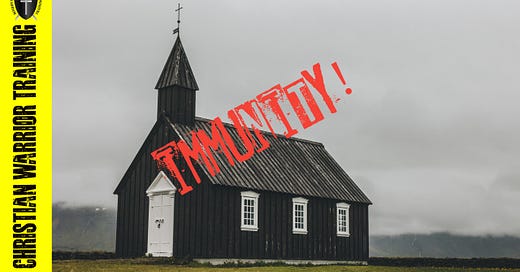Enhancing Church Security: Understanding Idaho's House Bill No. 601
The state of Idaho, my home state, just passed House Bill 601 that now grants immunity to church safety team members that act on behalf of the church on a volunteer basis. This includes volunteers that use either lethal or non lethal force to protect the church and its congregation.
This legislation is comprehensive, providing clear definitions that lay the groundwork for its broad application. It categorizes volunteers as individuals who offer their services without financial compensation, underlining the selfless commitment of those who ensure the safety of worshippers. Additionally, it broadens the concept of religious organizations to include various communities bound by shared beliefs and practices, from churches to synagogues and other houses of worship.
Security personnel, defined as those authorized by these organizations to protect and ensure the safety of congregants, are at the heart of this bill. By clarifying their legal protection, House Bill No. 601 emboldens church safety ministries, encouraging the participation of volunteers in security roles and providing a framework that supports their critical contributions to the safety and security of Idaho's places of worship
.
Legal Immunity Explained
A pivotal aspect of House Bill No. 601 is the provision of legal immunity to volunteer security personnel and the religious organizations they serve. This immunity covers civil damages, essentially protecting volunteers and organizations from lawsuits related to their security efforts. Importantly, the bill specifies that this immunity extends to actions involvi
ng both non lethal and lethal force, subject to certain limitations.
Limitations and Responsibilities
While providing broad protections, the bill also outlines important limitations to this immunity. Specifically, it does not extend to actions or omissions characterized by unreasonable, reckless, gross negligence, or wanton conduct. This provision ensures a balance between granting immunity and holding individuals accountable for actions that significantly deviate from reasonable standards of conduct.
The Significance for Church Security Ministries
For church security ministries, House Bill No. 601 represents a crucial development. By clarifying the legal standing of volunteer security personnel, the bill encourages the formation and operation of security teams within religious organizations. It acknowledges the vital role these volunteers play in ensuring the safety of congregants, providing a legal framework that supports their efforts.
Encouraging Volunteer Participation
One of the bill's likely impacts is an increase in volunteer participation in church security roles. Knowing that the law provides certain protections, individuals may be more inclined to serve in these vital positions. This potential uptick in volunteer security personnel is a positive outcome for churches, enhancing their ability to safeguard their congregations.
Training and Compliance
Despite the protections offered by House Bill No. 601, church security ministries must prioritize training and adherence to legal standards. The limitations on immunity underscore the importance of responsible conduct and the need for comprehensive training programs. These programs should focus not only on physical security measures but also on ethical and legal considerations, ensuring that volunteers are well-prepared to act within the boundaries of the law.
If you want to know more and get free training, you can check out my course on use of force. Just click the photo below.
A Step Forward in Faith-Based Security
By providing legal protections for those who stand guard over places of worship, Idaho is acknowledging the changing landscape of faith-based gatherings. This legislation is a significant step forward, offering reassurance to those who dedicate themselves to the safety of their religious communities.
As we reflect on the implications of House Bill No. 601, it's clear that the path to enhanced security in places of worship involves both legal safeguards and a commitment to responsible, well-trained volunteer efforts. This dual approach ensures not only the safety of congregants but also the preservation of the sanctity and peace that places of worship are meant to embody.
We welcome your thoughts and experiences regarding church security and the impact of legal measures such as House Bill No. 601. Share your comments below to contribute to this important discussion on safeguarding our places of worship.







The ease and speed with which the legislation was passed unmistakeably shows that Almighty God blessed this bill. Representative Dixon and Senator Toews did an amazing job of carrying the bill through their respective chambers. It was signed by Governor Little on April 1, 2024 and will go into effect July 1, 2024. When I began drafting the bill, only Texas and Mississippi had similar laws. The Texas law, like the similar 1997 federal law, however, didn't provide immunity for the church, only for the security team members. The Idaho bill provided immunity for both. Thank you Keith for an excellent article that did a great job of fully covering the legislation. I have been invited to present next week an overview of the effects of the new Idaho law to the church security team in Sandpoint that asked for the bill to be drafted, and I am going to encourage the church to pay for a subscription to your newsletter and training. I just paid for a subscription for myself. May the Lord bless you richly in your mission to proclaim His gospel and protect His children. Steve Smith, Esq.
I’m in CA and lead the safety team for my church. It is concerning here how I would likely be prosecuted and imprisoned for protecting my church family from the worst imaginable threat. Time to make Idaho my permanent home. 🇺🇸